CDH Staff Education Program Sept – Dec 2022
| We are proud to present the new staff education program of the Centre for Digital Humanities (CDH). We again offer a diverse program with lectures and hands-on workshops on all kinds of different aspects of digital humanities. Registration is open now. Attendance to CDH courses and workshops (not the webinars) will be compensated by the Centre for Digital Humanities in terms of DCU (22 hours = 1 DCU). The DCU’s will be automatically settled with your department at the end of each course. |
22 September
CDH Webinar: Digital Humanities 101 – An introduction to DH thinking
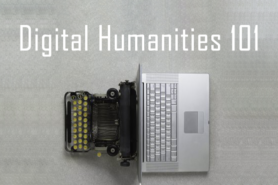
This webinar is set up as an entry into Digital Humanities (DH) thinking. Professor Hugo Quené will show and discuss how to work with digital data and how to employ digital methods in the humanities. The presentation is intended for everybody within the Faculty of Humanities (and beyond) interested in working with digital sources and/or digital methods.
4 October
UB & CDH Workshop: Working with large text corpora in I-Analyzer
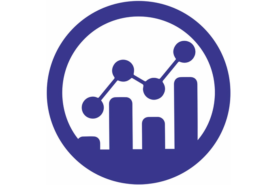
I-Analyzer is an online text and data mining application, developed by the Digital Humanities Lab, that combines online availability and ease of use with flexibility. This joint workshop by the University Library and the Centre for Digital Humanities will give an overview of how you can process text corpora to be used in I-Analyzer, and how to search, filter and visualize results. If you’re interested, it might be possible to add a document collection of your choice in I-Analyzer.
Read more & register13 October
CDH Workshop: Basics of Statistics – Hands-on training day for humanities staff

During this one day hands-on training, intended for researchers and teachers in the humanities, prof. Hugo Quené and research assistant Kirsten Schutter will learn you the basics of statistical data analysis. They will start with core concepts and principles, followed by how to describe statistical properties of data, choose and perform statistical tests. TIP: the CDH machine learning workshop for beginners on November 3 is an interesting follow-up to this course.
Read more & register18 October
CDH Workshop: Getting started with network visualization – introductory Gephi course for humanities staff
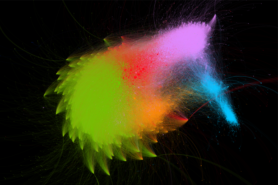
The image on the left is a network visualization of one and a half million tweets. In this workshop, Jeroen Bakker, junior researcher at Utrecht Data School, will introduce you to network analysis and visualization using Gephi. After this hands-on session, you will be able to conduct a network research on a large dataset.
Read more & register21 October
CDH Webinar: Talking XTC – Distant and close reading of digitized newspaper and radio data archives
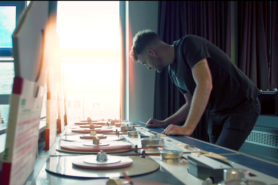
During this webinar media researcher Berrie van der Molen will talk about the methodological approach – the ‘leveled approach’ – he used writing his dissertation ‘Talking XTC: Drug discourse in post-war Dutch newspaper and radio debates’. Van der Molen will show how he combined analysis of Optical Character Recognition enriched newspaper data with analysis of Automatic Speech Recognition enriched radio data.
Read more & register1, 8, 15 & 22 November
CDH Workshop: Entry level Python course for humanities staff
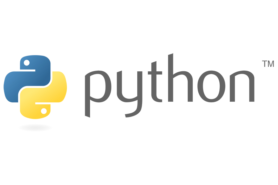
This four-day entry level course in Python is designed for humanities teachers and researchers who want to learn the foundations of Python in order to write simple programs using the most common structures. No previous programming experience is needed. The course will be given by Julian Gonggrijp and Jelte van Boheemen, scientific developers of the Digital Humanities Lab. During this course, it is possible to work with your own dataset.
Read more & register3 November
CDH Workshop: Principles & practices of machine learning – A hands-on training for beginners with applications in the humanities
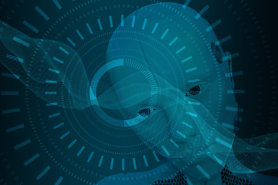
In this one-day course Hugo Schnack, assistant professor Language acquisition, processing and disorders, will give an introduction to what machine learning is, when and how it can be used and what it can do. In practicals you will train, test, and interpret machine learning models yourself on (real) datasets. Tip: follow the CDH workshop on October 13 to get familiar with the Basics of Statistics and R before you follow this training.
Read more & register18 November
CDH Lecture (hybrid): Understanding opinion dynamics – a (seemingly) simple model with many applications
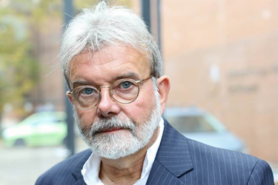
In this hybrid lecture Rainer Hegselmann, philosophy professor at the Frankfurt School of Finance & Management, will talk about the bounded confidence model. In that model individuals take seriously only those others whose opinions are not too far away from their own opinion. Although the model and its extensions are very simple according to the definitions, numerous surprising effects arise. You can attend this lecture both online and on-site.
Read more & register24 November
UB & CDH Workshop: Transkribus and Optical Character Recognition
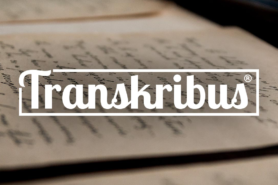
Thanks to improvements in AI, printed and handwritten texts can now be read almost perfectly by computers, using software for Handwritten Text Recognition (HTR) and Optical Character Recognition (OCR). During this demo-workshop Ruben Schalk, Information- and Collection Specialist at the University Library, will demonstrate and teach how to use OCR software and the Transkribus platform on example texts or material from your own research. Note: the CDH has purchased a Transkribus subscription that gives all UU-staff a big discount to this service.
Read more & register30 November
CDH Tutorial: Philosophy and computer simulations – two incompatible realms?
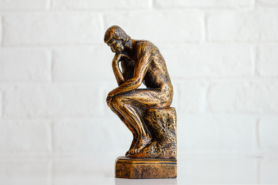
What role can computational models play in philosophy? Theoretical philosopher Dominik Klein will try to answer this question during this tutorial on November 30. This tutorial provides additional and practical insights on Rainer Hegselmann’s lecture on Opinion Dynamics on November 18, but can also be followed independently.
Read more & register7 December
CDH Workshop: Yoda for Humanities
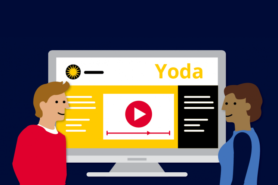
Yoda is the default storage infrastructure for research data in the Humanities faculty at Utrecht University. During this workshop Frans de Liagre Böhl, data manager for the Faculty of Humanities, will provide a hands-on introduction to Yoda, and will help you navigate the data related choices you encounter during the different phases of your research.
Read more & register13 December
UB & CDH Workshop: Visualizing spatial data on the georeferenced maps of the Special Collections
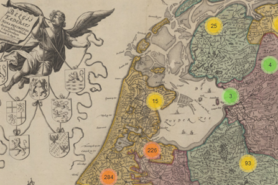
The famous ‘Atlas Maior’ van Blaeu has recently been georeferenced by the University Library. Within a few steps, you can use these high-resolution old maps to visualize spatial data, such as countries and cities. During this demo-workshop Ruben Schalk, Information- and Collection Specialist at the UB, will show and teach you how to integrate these digitized maps or your own dataset into data visualizations.
Read more & register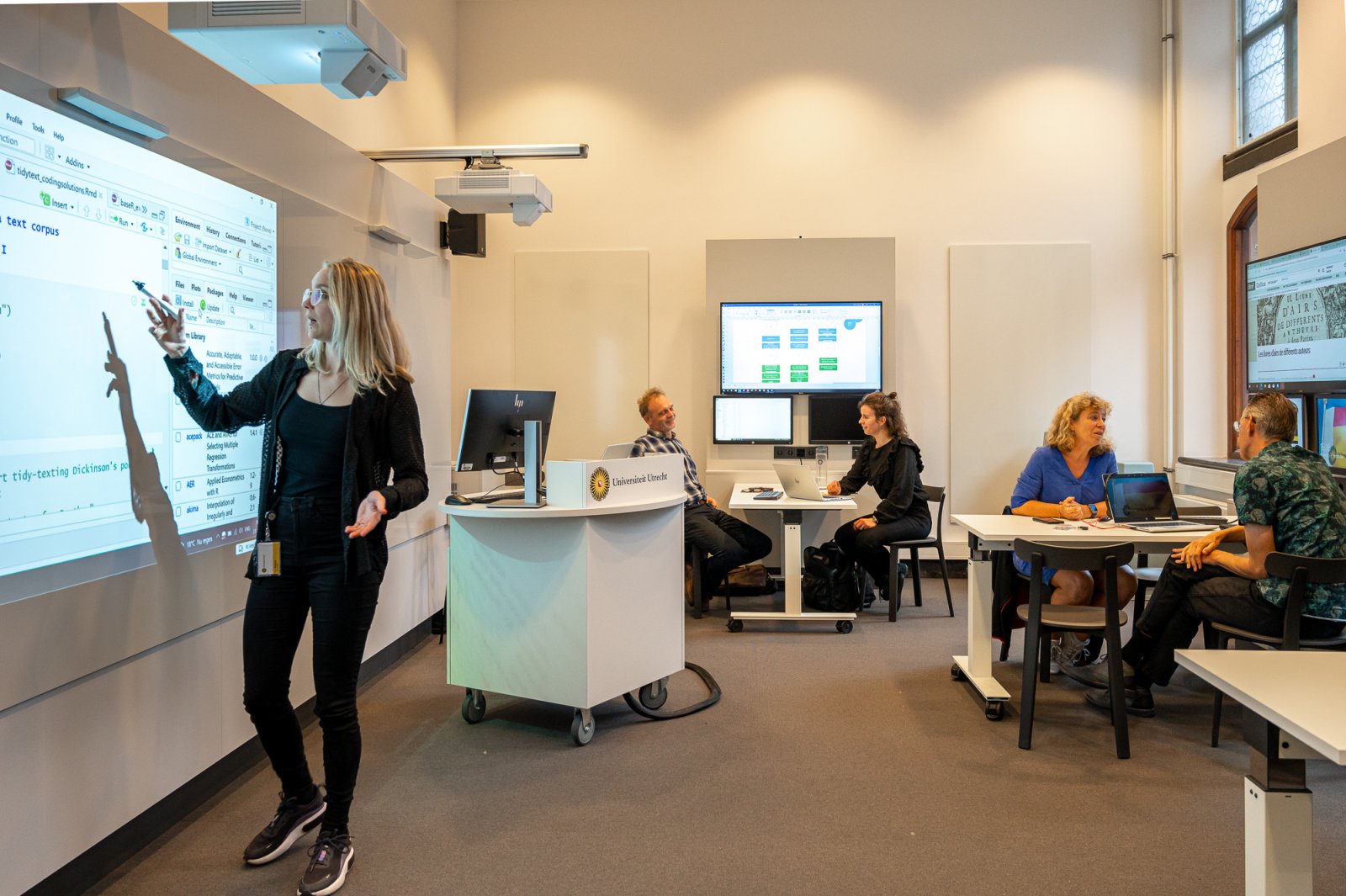
Living Lab Digital Humanities
All our on-site workshops take place in the Living Lab Digital Humanities in the University Library City Centre. There is room for a maximum of 16 participants. So register quickly for a workshop if you want to be assured of a place!

